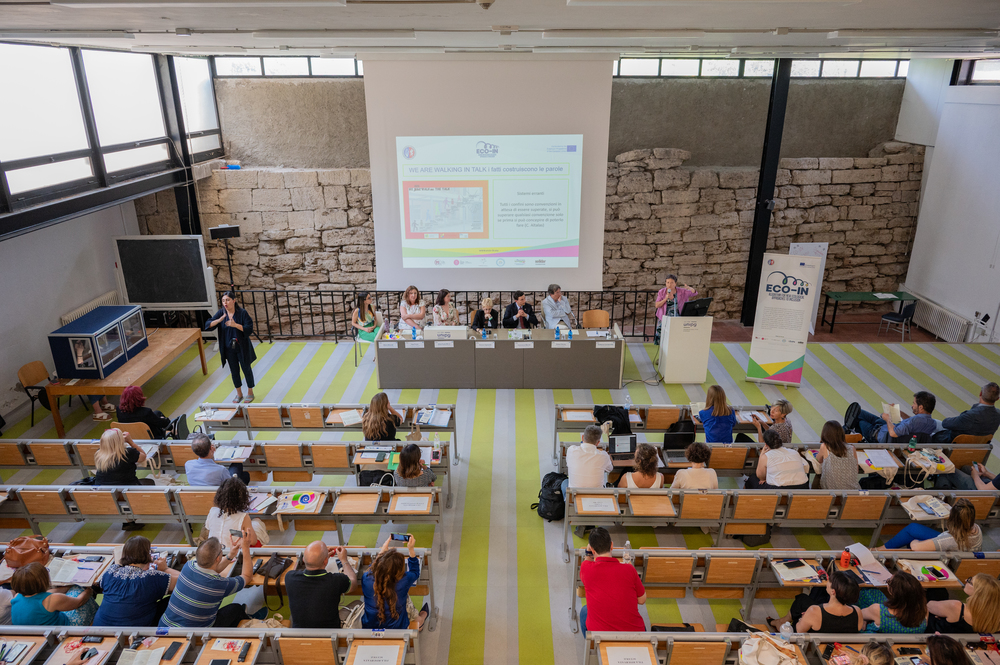New Ecological Approaches to Inclusion: The results of the ECO-IN Project

On 27 June the Final Conference of the Erasmus+ funded project ECO-IN: Algorithm for New Ecological Approaches to Inclusion took place in Perugia, Italy. The Algorithm for New Ecological Approaches to Inclusion (ECO-IN) project was launched in 2019, with the aim of developing new and innovative training model to generate inclusive schools and communities. In order to achieve this, the project consortium, comprising the University of Perugia, FORMA.Azione, the Lithuanian Education Trade Union, University of Urbino, MIRADA LOCAL, the School Inspectorate of Alba County (Romania) and SOLIDAR Foundation, ran in-depth research on the inclusion practices in primary and secondary education in Belgium, Italy, Lithuania, Romania, Spain.
Based on the needs identified across these EU member states, and following further research at EU level, the project delivers indicators for monitoring successful inclusion practices, policy recommendations to boost inclusion, and training to prepare all education stakeholders (teachers, school heads, policymakers, parents, families) to actively participate in a system that puts the learners’ well-being and development at the centre of their work.
Project partners and stakeholders gathered at the University of Perugia to find out more about the project’s results and findings. Annalisa Cannoni (European Commission, DG EAC) commended the ECO-IN project results and presented the Council Recommendation on Pathways to School Success which contents show similarities between the ECO-IN project’s ecological and whole school approach to inclusion.
The Conference’s first session revolved around the practicing of school inclusion through the promotion and implementation of an ecological approach. Project partner Annalisa Morganti (University of Perugia) discussed the values and challenges of an ecological model for inclusive schools. She pointed out that inclusion is a process which is not only related to schools but to an enlarged system and that through an ecological approach different stakeholders of this system can voice their needs. David Mitchell (University of Canterbury, New Zealand, UNESCO Chair) described inclusive education as education that should be able to fit every child’s needs and background, highlighting the need for more flexible and inclusive curricula.
Speakers of the second session elaborated on how to build trust among the key players of educational inclusion policies. Robert Roche (Autonomous University of Barcelona, Mirada Local) explained how a Prosocial Trust Center can be created. The creation of such centers were key to the ECO-IN project, as these are prosocial, participatory spaces – open to the community as a whole, to parents, to teachers, learners, and policy-makers – where collaborative decisions are made and different actions (from trainings to meetings) are designed and carried out. Sharing the experience of setting up Centro Prosociale Mille Voci, one of the pilot Prosocial Trust Centers, Stefania Cornacchia (Director of the School Complex “F. Petrucci” of Montecastrilli (Terni)) talked about the need to change attitudes of teachers when it comes to bringing inclusive education to the classroom, as often students prove to be very open to it.
Alessia Signorelli (University of Perugia) pointed out that in order to make schools inclusive, the focused should be on more than just teacher training. She explains that training on inclusion should bring together visions of different stakeholders and result in the active practice of school inclusion. In order to do so, she emphasized the need to involve external stakeholders and to create networks, such as those created in the Prosocial Trust Centers.
While discussing their project experience at the roundtable discussion, partners pointed out that “inclusion cannot be cheap”, and called for more funding to be allocated to education at the national level. In addition, they emphasized that besides a focus on Special Educational Needs (SEN), inclusive education also means paying attention to students’ different socio-economic and cultural backgrounds. To conclude, Alexandra Matthys (SOLIDAR Foundation), presented the ECO-IN Manifesto on School Inclusion which is based on project insights and reports made by project partners and on contributions made at the ECO-IN High Level Policy Conference, and also presented the Policy Recommendations that were developed based on project results.
While the ECO-IN project came to an end, the project results are not static. Find out more on the project results on the ECO-IN website and read here the ECO-IN Manifesto on School Inclusion and the ECO-IN Policy Recommendations that were developed in the framework of the project.


